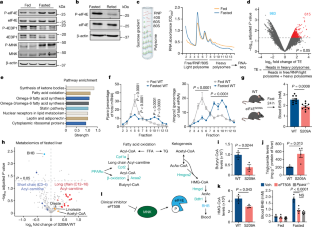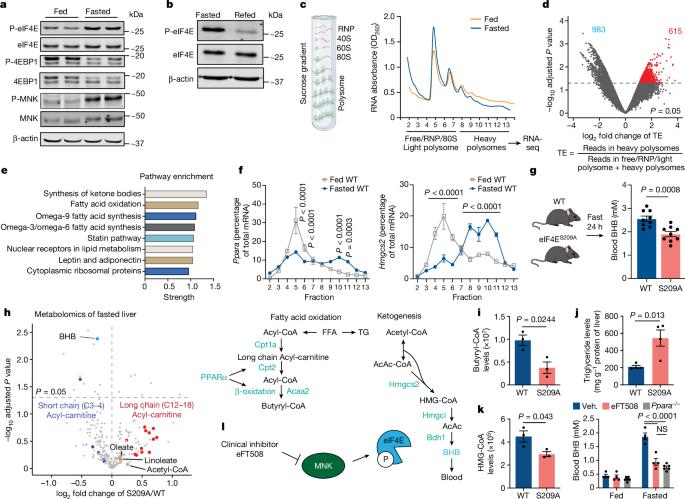Remodelling of the translatome controls diet and its impact on tumorigenesis
IF 50.5
1区 综合性期刊
Q1 MULTIDISCIPLINARY SCIENCES
引用次数: 0
Abstract
Fasting is associated with a range of health benefits1–6. How fasting signals elicit changes in the proteome to establish metabolic programmes remains poorly understood. Here we show that hepatocytes selectively remodel the translatome while global translation is paradoxically downregulated during fasting7,8. We discover that phosphorylation of eukaryotic translation initiation factor 4E (P-eIF4E) is induced during fasting. We show that P-eIF4E is responsible for controlling the translation of genes involved in lipid catabolism and the production of ketone bodies. Inhibiting P-eIF4E impairs ketogenesis in response to fasting and a ketogenic diet. P-eIF4E regulates those messenger RNAs through a specific translation regulatory element within their 5′ untranslated regions (5′ UTRs). Our findings reveal a new signalling property of fatty acids, which are elevated during fasting. We found that fatty acids bind and induce AMP-activated protein kinase (AMPK) kinase activity that in turn enhances the phosphorylation of MAP kinase-interacting protein kinase (MNK), the kinase that phosphorylates eIF4E. The AMPK–MNK–eIF4E axis controls ketogenesis, revealing a new lipid-mediated kinase signalling pathway that links ketogenesis to translation control. Certain types of cancer use ketone bodies as an energy source9,10 that may rely on P-eIF4E. Our findings reveal that on a ketogenic diet, treatment with eFT508 (also known as tomivosertib; a P-eIF4E inhibitor) restrains pancreatic tumour growth. Thus, our findings unveil a new fatty acid-induced signalling pathway that activates selective translation, which underlies ketogenesis and provides a tailored diet intervention therapy for cancer. During fasting, hepatocytes selectively remodel the translatome while global translation is downregulated, showing a new signalling property of fatty acids and that, on a ketogenic diet, treatment with eFT508 (also known as tomivosertib; a P-eIF4E inhibitor) restrains pancreatic tumour growth.


转译体控制饮食的重塑及其对肿瘤发生的影响
禁食与一系列健康益处有关1-6。人们对禁食信号如何引起蛋白质组变化以建立新陈代谢程序仍知之甚少。在这里,我们发现肝细胞选择性地重塑了翻译组,而在禁食期间,全局翻译却出现了矛盾性的下调7,8。我们发现,在禁食期间,真核翻译起始因子 4E (P-eIF4E)的磷酸化被诱导。我们发现,P-eIF4E 负责控制参与脂质分解和酮体产生的基因的翻译。抑制 P-eIF4E 会影响空腹和生酮饮食时的酮体生成。P-eIF4E 通过这些信使 RNA 的 5' 非翻译区(5' UTR)内的特定翻译调控元件对其进行调控。我们的研究结果揭示了脂肪酸的一种新信号特性,脂肪酸在禁食期间会升高。我们发现,脂肪酸与 AMPK 结合并诱导 AMP 激活蛋白激酶(AMPK)的激酶活性,而 AMPK 的活性反过来又增强了 MAP 激酶相互作用蛋白激酶(MNK)的磷酸化,MNK 是使 eIF4E 磷酸化的激酶。AMPK-MNK-eIF4E轴控制酮体生成,揭示了一种新的脂质介导的激酶信号通路,它将酮体生成与翻译控制联系在一起。某些类型的癌症使用酮体作为能量来源9,10,这可能依赖于 P-eIF4E。我们的研究结果表明,在生酮饮食中,使用 eFT508(又称 tomivosertib,一种 P-eIF4E 抑制剂)治疗可抑制胰腺肿瘤的生长。因此,我们的研究结果揭示了一种新的脂肪酸诱导信号通路,它能激活选择性翻译,是生酮的基础,并为癌症提供了一种量身定制的饮食干预疗法。
本文章由计算机程序翻译,如有差异,请以英文原文为准。
求助全文
约1分钟内获得全文
求助全文
来源期刊

Nature
综合性期刊-综合性期刊
CiteScore
90.00
自引率
1.20%
发文量
3652
审稿时长
3 months
期刊介绍:
Nature is a prestigious international journal that publishes peer-reviewed research in various scientific and technological fields. The selection of articles is based on criteria such as originality, importance, interdisciplinary relevance, timeliness, accessibility, elegance, and surprising conclusions. In addition to showcasing significant scientific advances, Nature delivers rapid, authoritative, insightful news, and interpretation of current and upcoming trends impacting science, scientists, and the broader public. The journal serves a dual purpose: firstly, to promptly share noteworthy scientific advances and foster discussions among scientists, and secondly, to ensure the swift dissemination of scientific results globally, emphasizing their significance for knowledge, culture, and daily life.
 求助内容:
求助内容: 应助结果提醒方式:
应助结果提醒方式:


